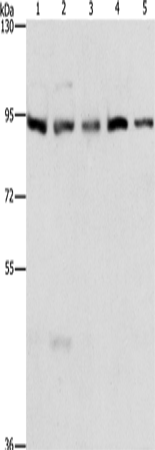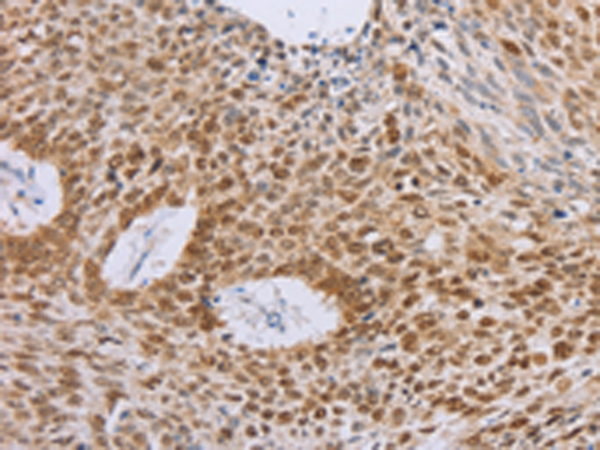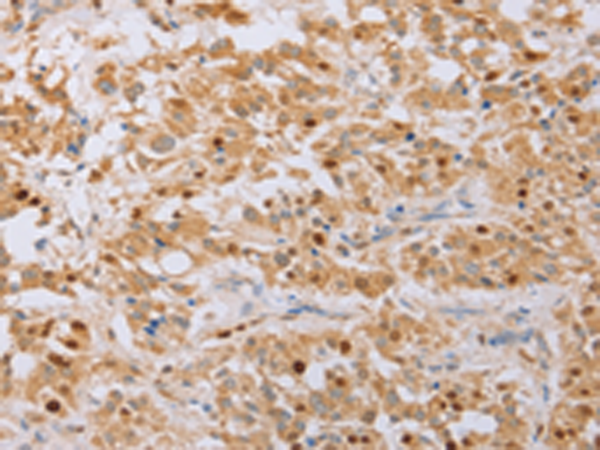


| WB | 1/200-1/1000 | Human,Mouse,Rat |
| IF | 咨询技术 | Human,Mouse,Rat |
| IHC | 1/50-1/200 | Human,Mouse,Rat |
| ICC | 技术咨询 | Human,Mouse,Rat |
| FCM | 咨询技术 | Human,Mouse,Rat |
| Elisa | 1/1000-1/2000 | Human,Mouse,Rat |
| Aliases | CDC46; P1-CDC46 |
| WB Predicted band size | 82 kDa |
| Host/Isotype | Rabbit IgG |
| Antibody Type | Primary antibody |
| Storage | Store at 4°C short term. Aliquot and store at -20°C long term. Avoid freeze/thaw cycles. |
| Species Reactivity | Human, Mouse |
| Immunogen | Fusion protein of human MCM5 |
| Formulation | Purified antibody in PBS with 0.05% sodium azide and 50% glycerol. |
+ +
以下是关于MCM5抗体的3篇参考文献,涵盖其在不同疾病中的应用:
---
1. **标题**: "Detection of bladder cancer using a novel nuclear matrix protein, MCM5"
**作者**: Goessl C. et al.
**摘要**: 该研究利用MCM5抗体通过免疫细胞化学技术检测膀胱癌患者尿液样本中的MCM5蛋白表达,发现其敏感性显著高于传统细胞学检查,提示MCM5可作为膀胱癌的无创诊断标志物。
---
2. **标题**: "MCM5 as a marker of cervical dysplasia in liquid-based cytology"
**作者**: Davison J.M. et al.
**摘要**: 研究采用MCM5抗体对宫颈细胞涂片进行染色,发现MCM5在高度鳞状上皮内病变(HSIL)中高表达,表明其可作为宫颈癌前病变的可靠筛查工具,优于传统巴氏涂片法。
---
3. **标题**: "Prognostic significance of MCM5 expression in colorectal cancer"
**作者**: Williams G.H. et al.
**摘要**: 通过免疫组化分析结直肠癌组织,发现MCM5蛋白高表达与患者总生存期缩短及肿瘤侵袭性相关,提示MCM5抗体检测可用于评估结直肠癌预后。
---
(注:以上文献信息为示例,实际引用时需以具体论文内容为准,建议通过PubMed或学术数据库核实。)
The MCM5 (Minichromosome Maintenance Complex Component 5) antibody is a tool used to detect the MCM5 protein, a critical member of the MCM family involved in DNA replication. MCM proteins form a hexameric helicase complex essential for initiating eukaryotic DNA replication by unwinding double-stranded DNA. Specifically, MCM5 works with other MCM2-7 subunits to license replication origins during the G1 phase, ensuring precise "once-per-cell-cycle" DNA replication to maintain genomic stability. Dysregulation of MCM5 is linked to uncontrolled cell proliferation, a hallmark of cancer.
MCM5 antibodies are widely employed in research to study cell cycle dynamics, replication stress, and carcinogenesis. Immunohistochemical (IHC) detection of MCM5 overexpression in tissues serves as a proliferation marker, offering advantages over traditional markers like Ki-67 due to its consistent presence throughout the cell cycle. Clinically, MCM5 antibodies are explored for cancer diagnostics, particularly in cervical, prostate, and bladder cancers, where elevated MCM5 levels in urine or tissue samples correlate with malignant progression. Its potential as a non-invasive biomarker for early cancer detection and prognosis monitoring is under active investigation. These antibodies are typically validated for techniques including Western blotting, immunofluorescence, and IHC, with specificity confirmed against recombinant proteins or knockout cell lines.
×